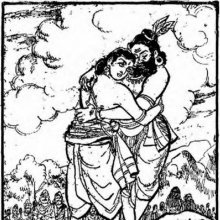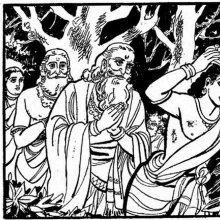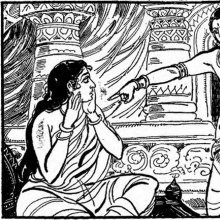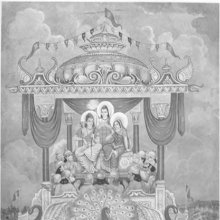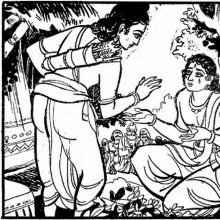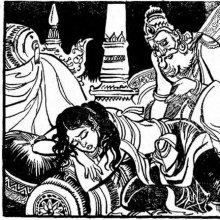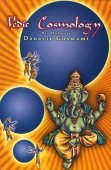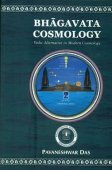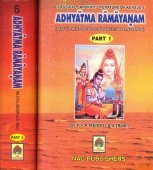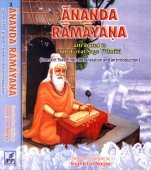Bharata, Bhārata, Bharatā, Bharaṭa: 44 definitions
Introduction:
Bharata means something in Buddhism, Pali, Hinduism, Sanskrit, Jainism, Prakrit, the history of ancient India, Marathi, Hindi. If you want to know the exact meaning, history, etymology or English translation of this term then check out the descriptions on this page. Add your comment or reference to a book if you want to contribute to this summary article.
Images (photo gallery)
(+19 more images available)
In Hinduism
Natyashastra (theatrics and dramaturgy)
Source: Wisdom Library: Nāṭya-śāstra1) Bharata (भरत) refers to an “actor” and represents a member of a theatrical part according to the Nāṭyaśāstra chapter 35. Accordingly, “as he alone conducts as the leader the performance of a play by acting in many roles and playing many instruments and by providing many accessories, he is called Bharata”.
Note: The term “Bharata” seems to have originally meant those who sang ballads connected with the heroic exploits of the Bharata race. The term ‘Bharthari’ meaning singers on the exploits of Bhartṛhari a prince who renounced the world and attained spiritual eminence, is analogous to Bharata. The Bharata ballads were the nucleus of the Mahābhārata According to the hypothesis of Winternitz, such ballads gave rise to drama. See in this connexion the author’s Contributions to the History of Hindu Drama, Calcutta, 1957, pp. 15ff.
2) Bhārata (भारत) refers to one of the four “ways of using weapons” (releasing missiles); it is a Sanskrit technical defined in the Nāṭyaśāstra chapter 11. These ‘ways’ are known as nyāya and arise out of the various cārīs (‘dance-steps’).
(Instructions of Bhārata): “Putting forward the shield with the left hand and taking the weapon the actor should walk about on the stage. Stretching the hand forward fully and then drawing it back he should move the shield at his back from side to side and flourish the weapon around his head, and it should also be turned round [about the wrist] near the cheek. And again the hands holding the weapon and the shield should be flourished gracefully around the head”.
Source: archive.org: The mirror of gesture (abhinaya-darpana)One of the Hands of Famous Emperors.—For Bharata, the Śikhara hand held on the right shoulder.

Natyashastra (नाट्यशास्त्र, nāṭyaśāstra) refers to both the ancient Indian tradition (shastra) of performing arts, (natya—theatrics, drama, dance, music), as well as the name of a Sanskrit work dealing with these subjects. It also teaches the rules for composing Dramatic plays (nataka), construction and performance of Theater, and Poetic works (kavya).
Purana and Itihasa (epic history)
Source: Wisdom Library: Bhagavata Purana1) Bharata (भरत):—Son of Daśaratha (son of Aja). He was an incarnation who appeared to his father in the form of a son. (see Bhāgavata Purāṇa 9.10.2)
2) Bharata (भरत):—Son of Duṣmanta (son of Rebhi). After performing a sacrifice called the marut-stoma, he was granted a son by the Maruts (demigods). He was named Bharadvāja. (see Bhāgavata Purāṇa 9.20.24)
Source: Wisdom Library: Varāha-purāṇa1) Bharata (भरत).—Son of Ṛṣabha, who was the son of Nābhi, according to the Varāhapurāṇa chapter 74. Nābhi was a son of Medhātithi, a grandson of Svāyambhuva Manu, who was created by Brahmā, who was in turn created by Nārāyaṇa, the unknowable all-pervasive primordial being. Bharata obtained from Ṛṣabha the region called Bhārata (which lies south of Hemādri). Bharata had a son named Sumati who inherited his kingdom when Bharata retired to the forest.
2) Bhārata (भारत) is the name of a region situated on the southern side of mount Meru, according to the Varāhapurāṇa chapter 75. Meru is one of the seven mountains located in Jambūdvīpa, which is ruled over by Āgnīdhra, a grandson of Svāyambhuva Manu, who was created by Brahmā, who was in turn created by Nārāyaṇa, the unknowable all-pervasive primordial being.
Bhārata is divided in nine regions:
- Indra,
- Kaseru,
- Tāmravarṇa,
- Gabhasti,
- Nāgadvīpa,
- Saumya,
- Gandharva,
- Vāruṇa,
- Bhārata.
Each is surrounded by an ocean (sāgara) and is one thousand yojanas in extent.
There are also seven major mountains (kulaparvata) found in Bhārata:
- Mahendra,
- Malaya,
- Sahya,
- Śuktimān,
- Ṛkṣa,
- Vindhya,
- Pāriyātra.
The Varāhapurāṇa is categorised as a Mahāpurāṇa, and was originally composed of 24,000 metrical verses, possibly originating from before the 10th century. It is composed of two parts and Sūta is the main narrator.
Source: archive.org: Puranic Encyclopedia1) Bharata (भरत).—Son of Duṣyanta born of Śakuntalā. Genealogy. Descending in order from Viṣṇu-Brahmā-Atri-Candra-Budha-Purūravas-Āyus-Nahuṣa-Yayāti-Pūru-Janamejaya-Prācinvā-Pravira-Namasyu-Vītabhaya-Śuṇḍu-Bahuvidha-Saṃyāti-Rahovādī-Raudrāśva-Matināra-Santurodha-Duṣyanta-Bharata. (See full article at Story of Bharata from the Puranic encyclopaedia by Vettam Mani)
2) Bharata (भरत).—Son of Daśaratha. Genealogy. Descending in order from Viṣṇu-Brahmā-Marīci-Kaśyapa-Vivasvān-Vaivasvatamanu-Ikṣvāku-Vikukṣi-Śaśāda-Kakutstha-Anenas-Pṛthulāśva-Prasenajit-Yuvanāśva-Māndhātā-Purukutsa-Trasadasyu-Anaraṇya-Haryaśva-Vasumanas-Sudhanvā-Trayyāruṇa-Satyavrta-(Triśaṅku)-Hariścandra-Rohitāśva-Harita-Cuñcu-Sudeva-Bharuka-Bāhuka-Sagara-Asamañjas-Aṃśumān-Bhagīratha-Śrutanābha-Sindhudvīpa-Ayutāyus-Ṛtuparṇa-Sarvakāma-Sudās-Mitrasaha (Kalmāṣapāda)-Aśmaka-Mūlaka-Khaṭvāṅga (Dilīpa, Dīrghabāhu)-Raghu-Aja-Daśaratha-Bharata.
3) Bharata (भरत).—A son of Ṛṣabha. Genealogy and birth. Descending in order from Viṣṇu-Brahmā-Svāyambhuvamanu-Priyavrata-Agnīdhra-Nābhi-Ṛṣabha-Bharata.
4) Bharata (भरत).—A sage and the famous author of Nāṭyaśāstra. He was a critic who lived around the year 400 B.C. His book on Nāṭyaśāstra (Histrionics) is world famous. Kālidāsa in the second act of his drama, Vikramorvaśīya states that this Bharata used to coach the devas in the art of acting. Nāṭyaśāstra is a book comprising thirtyseven chapters dealing with the art of dance and music. He has written in detail about the four Alaṃkāras, Upamā, Dīpaka, Rūpaka and Yamaka and also about the ten requisites of a Kāvya. He has not forgotten to write about the defects and demerits of Kāvya also. Commentaries on Nāṭyaśāstra have been written by lions in the profession: Mitragupta, Harṣavardhana, Śaṅkuka, Udbhaṭa, Bhaṭṭanāyaka and Abhinavagupta. Of these 'Abhinavabhāratī' the commentary written by Abhinavagupta is the only one freely available now.
5) Bharata (भरत).—The Mahābhārata speaks about a few other Bharatas who were sons of Agni. Śamyu is a son of Agni known as Bharata. This Bharata has got another name, Ūrjja. (Śloka 6, Chapter 219, Vana Parva, Mahābhārata). There is an Agni of name Bharata with a son named Bhārata. When this Agni is propitiated one gets healthy and strong and so this Agni is called Puṣṭimān also. (Śloka 7, Chapter 219, Vana Parva, Mahābhārata). There is another Bharata son of an Agni called Adbhuta. It is this Agni that burns dead bodies. As this Agni lives permanently in Agniṣṭoma Yajñas; it gets the name of Niyata also. (Śloka 6, Chapter 222, Vana Parva, Mahābhārata).
6) Bhārata (भारत).—(MAHĀBHĀRATA). An epic written by Vyāsa. General information. The Mahābhārata is an epic. Bharata is acclaimed as the first emperor of Bhārata. The theme of this great epic is the fight between the two lines of princes belonging to the dynasty of Bharata. That is why the book is called Mahābhārata. The great size of the volume and the greatness of the wisdom contained therein have contributed much to its getting the name, Mahābhārata. Once the devas put the Mahābhārata in one pan of a balance and the Vedas in the other pan. Then the devas were convinced that the Mahābhārata weighed more than all the Vedas put together. (Ślokas 269-271, Chapter 1, Ādi Parva, Mahābhārata).* This book contains over a lakh of verses. There is no subject on earth which is not dealt with in the Mahābhārata. None of the world’s epics is so big as Mahābhārata. In size the Mahābhārata is double that of Homer’s Iliad and Odyssey put together. The following poem about it is worth mentioning now:
7) Bhārata (भारत).—(Bhāratavarṣa. India).
The purāṇas describe the Earth to be constituted of seven continents: Jambūdvīpa, Plakṣadvīpa, Śālmalīdvīpa, Kuśadvīpa, Krauñcadvīpa, Śākadvīpa and Puṣkaradvīpa. Of these India is Jambūdvīpa.
Source: Cologne Digital Sanskrit Dictionaries: The Purana Index1a) Bharata (भरत).—(Jaḍa): the eldest of the hundred sons of Ṛṣabha (Nābhi) and Jayantī; was devoted to Nārāyaṇa;1 a Mahābhāgavata; married Pāñcajanī, daughter of Viśvarūpa and she gave birth to five sons; was installed on the throne; protected his subjects righteously and performed yajñas by the method of Cāturhotra; having spent a million years thus he divided his property among his sons and placed Sumati on his throne; he left for the hermitage of Pulastya as a hermit and became constant in the worship of Hari; gave up his kingdom and sought refuge in Hari;2 a sage;3
- 1) Bhāgavata-purāṇa V. 4. 9; 7. 3; XI. 2. 17.
- 2) Ib. V. 5. 28; 7. (whole); X. 60. 41; Vāyu-purāṇa 33. 51-3.
- 3) Ib. 41. 44.
1b) A son of Daśaratha;1 had two sons Takṣa and Puṣkala who had Gāndhāra for their kingdom;2 wore bark of wood and ate food dressed with gomūtra, took bed on the bare earth during Rāma's exile, when he was at Nandigrāma meditating on the pādukā of Rāma he took his place on the śilā; his āśrama, where holy men congregated; returned to Ayodhyā with all royal paraphernalia on hearing of Rāma's arrival; embraced by Rāma;3 was present at Rāma's coronation;4 killed a number of Gandharvas.5
- 1) Bhāgavata-purāṇa IX. 10. 3; Vāyu-purāṇa 88. 184, 189; Viṣṇu-purāṇa IV. 4. 87.
- 2) Bhāgavata-purāṇa IX. 11. 12; Brahmāṇḍa-purāṇa III. 63. 185; Viṣṇu-purāṇa IV. 4. 104.
- 3) Bhāgavata-purāṇa IX. 10. 34-40, 43; Vāyu-purāṇa 108. 24, 33-5.
- 4) Viṣṇu-purāṇa IV. 4. 100.
- 5) Bhāgavata-purāṇa IX. 11. 13.
1c) A son of Duṣyanta and Śakuntalā; announced to Duṣyanta as such by a voice from the air; an aṃśa of Hari; brought up in his early age by the sage Kaṇva; became cakravarti after his father; anointed Adhirāṭ; performed 55 horse sacrifices on the banks of the Ganges and the Yamunā with the aid of Purodha Māmatiya; he tied to the sacrificial post 3300 horses and distributed liberally cows and elephants to priests; he brought under his subjection the Kirātas, Hūṇas, Yavanas, Āndhras, and all the Mlecchas; he recovered the celestial women from Rasātala; he ruled righteously for 27000 years; he had three wives of Vidarbha origin; as they did not resemble their father the nine sons born to these were killed by their mothers who feared that they might be set aside; to perpetuate his line, Bharata performed Marutsoma when the Maruts presented him Bharadvāja, son of Bṛhaspati whom he adopted as his son;1 made the 16 gifts;2 again performed Marutsoma for getting a son; Bharadvāja was born as Vitatha to Bharata when Bharata died.3
- 1) Bhāgavata-purāṇa IX. 20. 17-35; Matsya-purāṇa 49. 11-5, 28-31; Vāyu-purāṇa 99. 134; Viṣṇu-purāṇa IV. 19. 10-16.
- 2) Matsya-purāṇa 274. 12.
- 3) Vāyu-purāṇa 99. 152-8.
1d) A name of Brahmandanāgni*
- * Brahmāṇḍa-purāṇa II. 12. 8; Vāyu-purāṇa 29. 7.
1e) Also Bhāratavarṣa—a country adjacent to Meru: north of the sea and south of the Himālayas: nine divisions of; S. to N. 1000 Yojanas, from Kumarī to the Ganges' source: E. to W. 9000 Yojanas: the Kirātas were on the East and the Yavanas on the West: slowly the four castes grew; seven Kulaparvatas; was peopled by the Aryas and the Mlecchas and fed by a number of rivers of ever flowing waters like the Ganges, Sindhu: contains a number of kingdoms and tribes: four Yugas in.*
- * Brahmāṇḍa-purāṇa II. 15. 50; 16. 4-69; 29. 23; Vāyu-purāṇa 34. 57; 41. 85.
1f) A kingdom in the east, watered by the Ganges.*
- * Brahmāṇḍa-purāṇa II. 18. 50.
1g) Born from the middle of the hand of Brahmā.*
- * Matsya-purāṇa 3. 11.
1h) The famous author of the Nāṭyaśāstra; got Menakā, Ūrvaśī and Rambhā to enact Lakṣmīsvayamvara before Indra and Purūravas when Ūrvaśī fell in love with the latter and forgot her abhinaya, for which Bharata cursed her.*
- * Matsya-purāṇa 24. 27-33.
1i) A son of Karandhama.*
- * Matsya-purāṇa 48. 2.
1j) A son of Tālajangha and father of Vṛṣa.*
- * Viṣṇu-purāṇa IV. 11. 24-5.
1k) A tribe.*
- * Vāyu-purāṇa 47. 48.
2) Bharatā (भरता).—An Apsarasa and a daughter of Suyaśā.*
- * Vāyu-purāṇa 69. 14.
3a) Bhārata (भारत).—An ākhyāna by Vyāsa; the essentials of the Vedas are introduced for the use of women, Śūdras and others.*
- * Bhāgavata-purāṇa I. 4. 25, 29; 5. 3.
3b) Belonging to the line of Pūru; after the name of Bharata son of Duṣyanta;1 kingdom of the.2
Source: JatLand: List of Mahabharata people and placesBhārata (भारत) is a name mentioned in the Mahābhārata (cf. I.70.1) and represents one of the many proper names used for people and places. Note: The Mahābhārata (mentioning Bhārata) is a Sanskrit epic poem consisting of 100,000 ślokas (metrical verses) and is over 2000 years old.
Source: Shodhganga: The saurapurana - a critical studyBharata (भरत) refers to one of the four sons of Daśaratha who is the grandson of Raghu, according to the Vaṃśānucarita section of the 10th century Saurapurāṇa: one of the various Upapurāṇas depicting Śaivism.—Accordingly, [...] Raghu was the son of Dīrghabāhu. The son of Raghu was very famous from whom Daśaratha was born. Daśaratha had four sons who were religious and famous in the world. They were Rāma, Bharata, Lakṣmaṇa and Śatrughna. All of them were devoted to Lord Mahādeva. [...] When Rāma was about to be consecrated, his step mother Kaikeyī asked for two boons to Daśaratha to grant which he promised earlier. As a result Bharata became the king, Rāma, Lakṣmaṇa were sent to the forest along with Sītā.

The Purana (पुराण, purāṇas) refers to Sanskrit literature preserving ancient India’s vast cultural history, including historical legends, religious ceremonies, various arts and sciences. The eighteen mahapuranas total over 400,000 shlokas (metrical couplets) and date to at least several centuries BCE.
Vaishnavism (Vaishava dharma)
Source: VedaBase: Śrīmad Bhāgavatam 9.20.24-26Mahārāja Bharata, the son of Duṣmanta, had the mark of Lord Kṛṣṇa's disc on the palm of his right hand, and he had the mark of a lotus whorl on the soles of his feet. By worshiping the Supreme Personality of Godhead with a grand ritualistic ceremony, he became the emperor and master of the entire world. Then, under the priesthood of Māmateya, Bhṛgu Muni, he performed fifty-five horse sacrifices on the bank of the Ganges, beginning from its mouth and ending at its source, and seventy-eight horse sacrifices on the bank of the Yamunā, beginning from the confluence at Prayāga and ending at the source.
Source: Pure Bhakti: Brhad Bhagavatamrtam1) Bharata (भरत) refers to:—Brother of Śrī Rāmacandra. (cf. Glossary page from Śrī Bṛhad-bhāgavatāmṛta).

Vaishnava (वैष्णव, vaiṣṇava) or vaishnavism (vaiṣṇavism) represents a tradition of Hinduism worshipping Vishnu as the supreme Lord. Similar to the Shaktism and Shaivism traditions, Vaishnavism also developed as an individual movement, famous for its exposition of the dashavatara (‘ten avatars of Vishnu’).
Shaivism (Shaiva philosophy)
Source: Wisdom Library: ŚaivismBhārata (भारत) refers to one of the seven regions (navakhaṇḍa) situated within Jambūdvīpa, according to Parākhyatantra 5.61. It is also known as Bhāratakhaṇḍa. Jambūdvīpa is one of the seven continents situated within the world of the earth (pṛthivī). These continents are located above the seven pātālas and may contain even more sub-continents within them, are round in shape, and are encircled within seven concentric oceans.
According to the Parākhyatantra, “to the south of that is the landmass Bhārata, like the landmass Hari. Here the suffering was borne (bhṛta) by Bharata because of his sons,who followed bad paths”.
In the middle of these nine regions (e.g., Bhārata) is situated the golden mountain named Meru which rises above the surface of the earth by 84,000 yojanas while it penetrates the circle of the earth to a depth of sixteen yojanas.
The Parākhyatantra is an old Śaiva-siddhānta tantra dating from before the 10th century.
Source: Shodhganga: Iconographical representations of ŚivaBharata (भरत) or Bharatāgama refers to one of upāgamas (supplementary scriptures) of the Prodgītāgama which is one of the twenty-eight Siddhāntāgama: a classification of the Śaiva division of Śaivāgamas. The Śaivāgamas represent the wisdom that has come down from lord Śiva, received by Pārvatī and accepted by Viṣṇu. The purpose of revealing upāgamas (e.g., Bharata Āgama) is to explain more elaborately than that of mūlāgamas (e.g., Prodgīta-āgama) and to include any new idea if not dealt in mūlāgamas.

Shaiva (शैव, śaiva) or Shaivism (śaivism) represents a tradition of Hinduism worshiping Shiva as the supreme being. Closely related to Shaktism, Shaiva literature includes a range of scriptures, including Tantras, while the root of this tradition may be traced back to the ancient Vedas.
Kavya (poetry)
Source: Wisdom Library: KathāsaritsāgaraBharata (भरत) is the younger brother of Rāma, both sons of Daśaratha, the king of Ayodhyā, according to in the Kathāsaritsāgara, chapter 51. Accordingly, “... long ago king Daśaratha, the sovereign of Ayodhyā, had a son named Rāma, the elder brother of Bharata, Śatrughna and Lakṣmaṇa. He was a partial incarnation of Viṣṇu for the overthrow of Rāvaṇa, and he had a wife named Sītā, the daughter of Janaka, the lady of his life. As fate would have it, his father handed over the kingdom to Bharata, and sent Rāma to the forest with Sītā and Lakṣmaṇa”.
The story of Bharata was narrated by the Vidyādharī Kāñcanaprabhā to Naravāhanadatta while in a Svayambhū temple of Śiva, in order to demonstrate that “people who possess firmness endure for a long time mutual separation to which no termination is assigned”, in other words, that “heroic souls endure separation for so long a time”.
The Kathāsaritsāgara (‘ocean of streams of story’), mentioning Bharata, is a famous Sanskrit epic story revolving around prince Naravāhanadatta and his quest to become the emperor of the vidyādharas (celestial beings). The work is said to have been an adaptation of Guṇāḍhya’s Bṛhatkathā consisting of 100,000 verses, which in turn is part of a larger work containing 700,000 verses.
Source: Shodhganga: The Kavyamimamsa of RajasekharaBharata (भरत) is the name of an important person (viz., an Ācārya or Kavi) mentioned in Rājaśekhara’s 10th-century Kāvyamīmāṃsā.—Bharatamuni, is a well-known composer of NS, which is a treatise on Dramaturgy. His also the one of the eighteen apprentices of Kāvya-puruṣa. Rājaśekhara posits him as the founder of Nātaka or Rūpaka by saying ‘rupakinarupaṇīyaṃ bharatiḥ’ (Kāvyamīmāṃsā. Ch-2). However Rājaśekhara does not quoted his opinion anywhere from Bharata, but some of matters he was influenced by Bharata.

Kavya (काव्य, kavya) refers to Sanskrit poetry, a popular ancient Indian tradition of literature. There have been many Sanskrit poets over the ages, hailing from ancient India and beyond. This topic includes mahakavya, or ‘epic poetry’ and natya, or ‘dramatic poetry’.
Nirukta (Sanskrit etymology)
Source: Shodhganga: The significance of the mūla-beras (nirukta)Bharata is commonly explained as an acronym composed of the first letters of bhāva, rāga, and tāla; and the suffix nāṭyam in Tamil means dance. The two terms, “nāṭya” and “bharata” were combined to make the term Bharatanatyam. This classical dance tradition found a new form and structure in Tamilnadu in the 16th and 17th centuries. Bhagavati is of the opinion that the word bharata generally refers to a class of dancers. Siva, the lord of dance, taught abhinaya to one of his disciples, Tandu, who taught this art to sage Bharata.
Nirukta (निरुक्त) or “etymology” refers to the linguistic analysis of the Sanskrit language. This branch studies the interpretation of common and ancient words and explains them in their proper context. Nirukta is one of the six additional sciences (vedanga) to be studied along with the Vedas.
Shilpashastra (iconography)
Source: Shodhganga: The significance of the mūla-beras (śilpa)Bharata is the name of a deity depicted at Ramaswamy Temple in Kumbakonam (Kumbhakonam), representing a sacred place for the worship of Viṣṇu.—In the sannidhi for Rāma, there are icons of Rāma, Sītā, Lakṣmaṇa and Hanumān. [...] In front of the stone images are the utsava-mūrti of Rāma, Sītā, Lakṣmaṇa, Bharata, Satrukguṇa and Hanumān. Satrukguṇa is found to the left of Lakṣmaṇa and Bharata is found to the right of Rāma. Satrukguṇa and Bharata are found in standing posture with hands in añjali-hasta.

Shilpashastra (शिल्पशास्त्र, śilpaśāstra) represents the ancient Indian science (shastra) of creative arts (shilpa) such as sculpture, iconography and painting. Closely related to Vastushastra (architecture), they often share the same literature.
Shaktism (Shakta philosophy)
Source: Google Books: ManthanabhairavatantramBhārata (भारत) refers to the land of India, according to Tantric texts such as the Kubjikāmata-tantra, the earliest popular and most authoritative Tantra of the Kubjikā cult.—Accordingly, “[...] The Virgin (goddess) (kumārikā) established her fame in the land of Bhārata (in this way) and so the meritorious and holy Region of the Virgin (kaumārikākhaṇḍa) came into being”.
Note: The Svacchandabhairavatantra also refers to the Land of Bhārata i.e. India as that of the Virgin, although it is not associated with her Yoni. According to the cosmology of the Svacchandabhairavatantra (cf. Tantrāloka chapter eight) there are eight continents. Each of them lies beyond one of eight mountain chains that surround mount Meru in the centre. Bhārata is to the south of the Himalayan chain, which is itself south of Meru and is shaped like a bow. It differs from the other continents because the beings who inhabit most of it can only experience pleasure and pain (bhoga) and not produce Karma. Bhārata is divided into nine islands, separated from one another by seas. The island closest to the Himalayas is called Kumārikā. This is India. Of all the parts of the continent of Bhārata, this is where Karma is created and destroyed.

Shakta (शाक्त, śākta) or Shaktism (śāktism) represents a tradition of Hinduism where the Goddess (Devi) is revered and worshipped. Shakta literature includes a range of scriptures, including various Agamas and Tantras, although its roots may be traced back to the Vedas.
Jyotisha (astronomy and astrology)
Source: Wisdom Library: Brihat Samhita by VarahamihiraBharata (भरत) is the name of an ancient country, kingdom, or tribe of people, according to the Bṛhatsaṃhitā (chapter 16) (“On the planets—graha-bhaktiyoga”), an encyclopedic Sanskrit work written by Varāhamihira mainly focusing on the science of ancient Indian astronomy astronomy (Jyotiṣa).—Accordingly, “[...] Jupiter presides over the eastern part of the Indus, the western half of Mathurā, the countries of Bharata and Sauvīra; the town of Srughna, the province of Udīcya, the Vipāśā and the Śatadru rivers; the countries of Ramaṭha, Śālvā; Traigarta, Paurava, Ambaṣṭa, Pārata, Vāṭadhāna, Yaudheya, Sārasvata, Arjunāyana, one half of Matsya; [...]”.

Jyotisha (ज्योतिष, jyotiṣa or jyotish) refers to ‘astronomy’ or “Vedic astrology” and represents the fifth of the six Vedangas (additional sciences to be studied along with the Vedas). Jyotisha concerns itself with the study and prediction of the movements of celestial bodies, in order to calculate the auspicious time for rituals and ceremonies.
General definition (in Hinduism)
Source: Apam Napat: Indian Mythology1) Bharata was one of the most illustrious kings of the Chandra dynasty, which was also referred to as the Bharata dynasty from his time. He was the son of Dushyanta and Shakuntala. He showed an aptitude for war from an early age and even defeated his father when he was still a boy. That story is told here. He had many sons but he did not find any of them worthy of succeeding him. Therefore, he performed a great Yagna and a son named Bhumanyu was born to him. Bhumanyu was the successor to Bharata.
2) Bharata is the son of King Dasharatha of Ayodhya and his second queen Kaikeyi. His father wanted to crown Rama, his eldest son (by his first wife Kausalya), but Kaikeyi intervened and got him to make Bharata his heir-apparent. Rama was also sent on an exile for fourteen years to the forest, accompanied by his wife Sita and his brother Laxmana. Dasharatha died of grief.
3) Bharata was a King of the Solar dynasty, the son of Dhruvasandhi and an ancestor of Rama. His son is Asita.
Source: WikiPedia: Hinduism1) In the Hindu epic Ramayana, Bharata was the second brother of the main protagonist Rama, and the son of Dasaratha and Kaikeyi. Dasaratha was the emperor of Ayodhya and belonged to the Suryavansha or Solar Dynasty. It is said that after Rama, he was the symbol of dharma and idealism. A few commentators, however, deem Bharata to be even greater than Rama himself in virtue. He is considered to be born in the aspect of the Sudarshana Chakra, the most famous of Vishnu's Panchayudhas.
etymology: Bharata (Sanskrit: भरत, Indonesian: Barata, Chinese: Poloto, Burmese: Bhadra, Malay: Baradan, Tamil: Paratan, Thai: Phra Phrot)
2) Bharata (भरत): Means "to be or being maintained"). Bharat may be
- a name of Agni
- a name of Rudra
- one of the Adityas
- Emperor Bharata, son of Dushyanta and Shakuntalā
- Bharata (Ramayana), a son of Dasharatha, younger brother of Rama
- Bharata Muni, the author of the Natyashastra
- Bharata (Bhagavata), the eldest of a hundred sons of a saintly king by name Rishabha Deva according to the Bhagavata purana.
3) Bhārata (भारत): Meaning ("descended from Bharata"). Bhārata may refer to
- The Bhāratas, an Aryan tribe of the Rigveda
- an early epic forming the core of the Mahabharata (allegedly comprising about a quarter of the extended epic)
- the Republic of India (properly, Bhārata GaNarājya, भारत गणराज्य).
Bharata is the incarnation of Pradyumna.
In Buddhism
Theravada (major branch of Buddhism)
Source: Pali Kanon: Pali Proper Names1. Bharata. A sage of old who, as a result of living the holy life, was born in the Brahma world. J.vi.99.
2. Bharata. The Bodhisatta born as the king of Roruva and husband of Samuddavijaya. For his story see the Aditta Jataka. J.iii.470 ff.
3. Bharata. A hunter who brought from the Himalaya the chief of a herd of monkeys whose cry was one of the noises mentioned in the Atthasadda Jataka (q.v.). J.iii.432.
4. Bharata Thera. He was a householder of Campa, and, having heard that Sona Kolivisa had left the world, he, too, with his brother, Nandaka, entered the Order, soon afterwards becoming an arahant. Later, he helped his more slow witted brother to obtain insight.
In the past Bharata gave to Anomadassi Buddha a pair of comfortable and very beautiful sandals. Thag.vss.175, 176; ThagA.i.300f.
5. Bharata. King of the Soviras in the time of Renu. His capital was in Roruva. D.ii.235f.
6. Bharata. A king of Benares, belonging to the dynasty of Okkaka. He was the father of Dasaratha (q.v.). MT. 130.
7. Bharata. A scion of the Mahasammata race and son of Sagaradeva. He was the father of Angirasa. Mhv.ii.4; Dpv.iii.6.
-- or --
A title by which
Pancala, king of Uttarapancala, is addressed in the Sattigumba Jataka (J.iv.435); also the king of Benares, in the Sankhapala Jataka (J.v.170) and Manoja, king of Benares, in the Sona Nanda Jataka (J.v.317, 326).The scholiast explains (J.v.317) the word by ratthabharadharitaya.
Theravāda is a major branch of Buddhism having the the Pali canon (tipitaka) as their canonical literature, which includes the vinaya-pitaka (monastic rules), the sutta-pitaka (Buddhist sermons) and the abhidhamma-pitaka (philosophy and psychology).
Tibetan Buddhism (Vajrayana or tantric Buddhism)
Source: Wisdom Library: Tibetan BuddhismBharata (भरत) is the name of a Tathāgata (Buddha) mentioned as attending the teachings in the 6th century Mañjuśrīmūlakalpa: one of the largest Kriyā Tantras devoted to Mañjuśrī (the Bodhisattva of wisdom) representing an encyclopedia of knowledge primarily concerned with ritualistic elements in Buddhism. The teachings in this text originate from Mañjuśrī and were taught to and by Buddha Śākyamuni in the presence of a large audience (including Bharata).

Tibetan Buddhism includes schools such as Nyingma, Kadampa, Kagyu and Gelug. Their primary canon of literature is divided in two broad categories: The Kangyur, which consists of Buddha’s words, and the Tengyur, which includes commentaries from various sources. Esotericism and tantra techniques (vajrayāna) are collected indepently.
General definition (in Buddhism)
Source: Wisdom Library: BuddhismBharata (भरत) (son of Sāgaradeva and father of Aṅgira) is the name of an ancient king from the Solar dynasty (sūryavaṃśa) and a descendant of Mahāsaṃmata, according to the Mahābuddhavaṃsa or Maha Buddhavamsa (the great chronicle of Buddhas) Anudīpanī chapter 1, compiled by Ven. Mingun Sayadaw. These twenty-eight kings were of long lives of asaṅkhyeyya (asaṃkhyeya) years. The twenty-seven kings [viz., Bharata] after Mahāsammata were his descendants. Some of these twenty-eight kings reigned in Kusavatī City, others in Rājagaha and still others in Mithilā.
In Jainism
General definition (in Jainism)
Source: Wisdom Library: JainismBhārata (भारत).—One of the seven regions (kṣetra) of Jambūdvīpa according to Jaina cosmology. Jambūdvīpa sits at the centre of madhyaloka (‘middle world’) is the most important of all continents and it is here where human beings reside. In Bhārata flows the twin rivers Gaṅgā and Sindhu.
Source: archive.org: Trisastisalakapurusacaritra1) Bharata (भरत) and Brāhmī were born as twins from Sunandā (one of Ṛṣabha’s wifes), according to chapter 1.2 [ādīśvara-caritra] of Hemacandra’s 11th century Triṣaṣṭiśalākāpuruṣacaritra: an ancient Sanskrit epic poem narrating the history and legends of sixty-three illustrious persons in Jainism.—Accordingly, “[...] when a little less than six pūrvas had passed after the wedding, while the Lord enjoyed himself with them, the Jīvas of Bāhu and Pīṭha fell from Sarvārthasiddhi and entered Sumaṅgalā’s womb as twins. Likewise the jīvas of Subāhu and Mahāpīṭha fell from Sarvārthasiddhi and entered Sunandā’s womb. [...] Sumaṅgalā bore children, Bharata and Brāhmī, as the east bears the sun and (morning) twilight lighting up the quarter of the sky”.
2) Bharata (भरत) (or Bhāratakṣetra, Bhāratavarṣa) refers to one of the seven zones of Jambūdvīpa which is situated in the “middle world” (madhyaloka), according to chapter 2.2.—Accordingly:—“Now, there are 7 zones here in Jambūdvīpa: Bhārata, Haimavata, Harivarṣa, Videha, Ramyaka, Hairaṇyavata, and Airāvata from south to north. Making the division between these there are 7 mountain-ranges, bounding the zones: Himavat, Mahāhimavat, Niṣadha, Nīla, Rukmin, and Śikharin with equal diameter at the base and top. [...] In the zone named Bhārata there are the great rivers, Gaṅgā and Sindhu; [...] The first of each pair flows to the east and the second to the west. [...]”.
3) Bharata (भरत) is son of Kaikeyī and Daśaratha, according to the Jain Ramayana and chapter 7.4 [Rāma and Lakṣmaṇa].—Accordingly, “There one day Kaikeyī bore a son indicated by an auspicious dream, the ornament of Bharata, named Bharata. Suprabhā also bore a son, a joy to the family, named Śatrughna, possessing power of arm to kill enemies. Bharata and Śatrughna, inseparable day and night from affection, looked like another Baladeva and Vāsudeva. King Daśaratha looked with his four sons like Mt. Meru with its mountains in the shape of elephants’ tusks”.
Source: Encyclopedia of Jainism: Tattvartha Sutra 3: The Lower and middle worldsBharata (भरत) or Bhāratavarṣa refers to a region of Jambūdvīpa: the first continent of the Madhya-loka (middle-word), according to the 2nd-century Tattvārthasūtra 3.10. It is named after supreme lord (cakravarti) Bharata. The Bharata region is surrounded by Himavāna Mount in the north, and an ocean in the south, east and west directions. Bhāratakṣetra is divided in six subcontinents by the Vijayārdha Mountain range in the middle and the rivers Ganga and Sindhu flowing from north to south. The mountain chain Himavana separates the Bharata and Haimavata regions. Gaṅga and Sindhu rivers divide Bharata-kṣetra.
Bharata, Airāvata and Videha except Uttarakuru and Devakuru are the regions of labour i.e. where spiritual effort is possible also. There are 15 regions of labour in the Two-and-half continents (dhāi-dvīpa) namely; five in Bharata, five in Airāvata and five in Videha regions. The region where the inhabitants engage themselves in the six activities /occupations are called region of labour. The Human beings living in the regions of labour are called inhabitants of the region of labour (karmabhūmija).
Jambūdvīpa (containing the Bharata region) is in the centre of all continents and oceans; all continents and oceans are concentric circles with Jambūdvīpa in the centre. Like the navel is in the centre of the body, Jambūdvīpa is in the centre of all continents and oceans. Sumeru Mount is in the centre of Jambūdvīpa. It is also called Mount Sudarśana.

Jainism is an Indian religion of Dharma whose doctrine revolves around harmlessness (ahimsa) towards every living being. The two major branches (Digambara and Svetambara) of Jainism stimulate self-control (or, shramana, ‘self-reliance’) and spiritual development through a path of peace for the soul to progess to the ultimate goal.
India history and geography
Source: Singhi Jain Series: Ratnaprabha-suri’s Kuvalayamala-katha (history)Bhārata (भारत) is the name of a work written by Vyāsa, as mentioned by Uddyotanasūri in his 8th-century Kuvalayamālā (a Prakrit Campū, similar to Kāvya poetry) narrating the love-story between Prince Candrāpīḍa and the Apsaras Kādambarī.—The Kuvalayamala (779 A.D.) is full of cultural material which gains in value because of the firm date of its composition. [...] On pages 3.18-4.12, Uddyotanasūri gives the names of a number of Kathās and their authors, in Sanskrit, Prakrit and Apabhramsha, [i.e., Vyāsa and Vālmīki to whom we owe Bhārata and Rāmāyaṇa], [...]—That was the usual practice of all writers like Subandhu, Bāṇa, Daṇḍin, Haribhadra, Svayaṃbhū etc. We are able to know the names of about fifty works including romances. Dr. A. N. Upadhye has dealt with these in his paper entitled “Works and Authors referred to in the Kuvalayamālā of Uddyotanasūri” submitted to the A.I.O.C. Session at Gauhati.

The history of India traces the identification of countries, villages, towns and other regions of India, as well as mythology, zoology, royal dynasties, rulers, tribes, local festivities and traditions and regional languages. Ancient India enjoyed religious freedom and encourages the path of Dharma, a concept common to Buddhism, Hinduism, and Jainism.
Languages of India and abroad
Pali-English dictionary
Source: Sutta: The Pali Text Society's Pali-English DictionaryBharatā, (f.) (abstr. fr. bhara) only in cpd. dub° difficulty to support, state of being hard to maintain, synonymous with kosajja at A. IV, 280, and kuhanā at A. V, 159, 161.—opp. subharatā A. IV, 280. (Page 499)

Pali is the language of the Tipiṭaka, which is the sacred canon of Theravāda Buddhism and contains much of the Buddha’s speech. Closeley related to Sanskrit, both languages are used interchangeably between religions.
Marathi-English dictionary
Source: DDSA: The Molesworth Marathi and English Dictionarybharata (भरत).—n A factitious metal compounded of copper, pewter, tin &c. 2 Green carbonate of lime.
--- OR ---
bharata (भरत).—f Commonly bharīta in the three first senses.
--- OR ---
bharāṭā (भराटा).—m (bhara! Whirr! flurr!) Noisy rising or flying (of birds); noisy whisking about (as of light rubbish or articles); noisy blowing or puffing (of wind); noisy dashing (of a shower of rain); swift, impetuous, or animated action (of running, going, speaking, eating); close pressure and urgency (of matters to be done); smart and brisk despatch (of writing-matters, jobs, or businesses); noisy or lively action or movement in general. v hō, cāla, lāga, uḍa, kara, māṇḍa, cālava, lāva, uḍava. 2 Exceeding copiousness (of a harvest or any product of the earth--pikācā bha0, dhānyācā bha0, āmbyācā bha0, amadānīcā bha0; as, in English, heavy crop). 3 Used in comp. or as a ind in the general sense of Copious, overflowing, weighty, mighty; as bharāṭā pīka, bharāṭā pāūsa, bharāṭā vārā. 4 Rapid and utter consumption, exhaustion, or despatch (as of eatables or of jobs and works); smart and full clearance. v uḍa, hō, karūna ṭāka, kara.
--- OR ---
bhārata (भारत).—n (S) India proper. The name of the great epic poem of the Hindus. Applied figuratively to a long and tedious story, to an intricate and prolonged business &c.
Source: DDSA: The Aryabhusan school dictionary, Marathi-Englishbharata (भरत).—n A kind of metal compounded of copper, pewter, tin &c.
--- OR ---
bharāṭā (भराटा).—m Exceeding copiousness. a Copi- ous. Ex. bharāṭā pāūsa.
--- OR ---
bhārata (भारत).—n India proper. The Mahâbhârata. A long work. Ex. bhārata racaṇēṃ.
Marathi is an Indo-European language having over 70 million native speakers people in (predominantly) Maharashtra India. Marathi, like many other Indo-Aryan languages, evolved from early forms of Prakrit, which itself is a subset of Sanskrit, one of the most ancient languages of the world.
Sanskrit dictionary
Source: DDSA: The practical Sanskrit-English dictionaryBharaṭa (भरट).—[bhṛ-aṭan]
1) A potter.
2) A servant.
Derivable forms: bharaṭaḥ (भरटः).
--- OR ---
Bharata (भरत).—[bharaṃ tanoti tan-ḍa]
1) Name of the son of Duṣyanta and Śakuntalā, who became a universal monarch (cakravartin), India being called Bharatavarṣa after him. He was one of the remote ancestors of the Kauravas and Pāṇḍavas; cf. Ś.7.33.
2) Name of a brother of Rāma, son of Kaikeyī, the youngest wife of Daśaratha. He was very pious and righteous, and was so much devoted to Rāma that when the latter prepared to go to the forest in accordance with the wicked demand of Kaikeyī, he was very much grieved to find that his own mother had sent his brother into exile, and refusing the sovereignty that was his own, ruled the kingdom in the name of Rāma (by bringing from him his two sandals and making them the 'regents' of the realm) till he returned after his fourteen years' exile. भरतो नाम कैकेय्यां जज्ञे सत्यपराक्रमः । साक्षाद्विष्णोश्चतुर्भागः सर्वैः समुदितो गुणैः (bharato nāma kaikeyyāṃ jajñe satyaparākramaḥ | sākṣādviṣṇoścaturbhāgaḥ sarvaiḥ samudito guṇaiḥ) || Rām.1.18.13.
3) Name of an ancient sage who is supposed to have been the founder of the science of music and dramaturgy.
4) An actor, a stage-player; तत्किमित्युदासते भरताः (tatkimityudāsate bharatāḥ) Mālatīmādhava (Bombay) 1.
5) A hired soldier, mercenary.
6) A barbarian, mountaineer.
7) An epithet of Agni.
8) A weaver.
9) Name of the sage Jaḍabharata.
Derivable forms: bharataḥ (भरतः).
--- OR ---
Bhārata (भारत).—a. (-tī f.) [भरतस्येदम्, भारतान् भरतवंश्यानधिकृत्य कृतो ग्रन्थः अण् (bharatasyedam, bhāratān bharatavaṃśyānadhikṛtya kṛto granthaḥ aṇ)] Belonging to or descended from Bharata.
-taḥ 1 A descendant of Bharata; (such as vidura; sañjātaharṣo munimāha bhārataḥ Mahābhārata (Bombay) 3.2.8; also dhṛtarāṣṭra, arjuna in Bg.).
2) An inhabitant of Bharatavarṣa or India.
3) An actor,
4) An epithet of the sun shining on the south of Meru.
5) Fire.
-tam 1 India, the country of Bharata; एतदूढगुरुभार भारतं वर्षमद्य मम वर्तते वशे (etadūḍhagurubhāra bhārataṃ varṣamadya mama vartate vaśe) Śiśupālavadha 14.5.
2) Name of the most celebrated epic poem in Sanskrit which gives the history of the descendants of Bharata with innumerable episodes. (It is attributed to Vyāsa or kṛṣṇadvaipāyana, but the work, as we have it at present, is evidently the production of many hands); श्रवणाञ्जलिपुटपेयं विरचितवान् भारताख्यममृतं यः । तमहमरागमकृष्णं कृष्णद्वैपायनं वन्दे (śravaṇāñjalipuṭapeyaṃ viracitavān bhāratākhyamamṛtaṃ yaḥ | tamahamarāgamakṛṣṇaṃ kṛṣṇadvaipāyanaṃ vande) || Ve.1.4; व्यासगिरां निर्यासं सारं विश्वस्य भारतं वन्दे । भूषणतयैव संज्ञां यदङ्कितां भारती वहति (vyāsagirāṃ niryāsaṃ sāraṃ viśvasya bhārataṃ vande | bhūṣaṇatayaiva saṃjñāṃ yadaṅkitāṃ bhāratī vahati) || Āryā. S.31.
3) The science of music and dramaturgy founded by Bharata.
-tī Speech, voice, words, eloquence; भारतीनिर्घोषः (bhāratīnirghoṣaḥ) Uttararāmacarita 3; तमर्थमिव भारत्या सुतया योक्तुमर्हसि (tamarthamiva bhāratyā sutayā yoktumarhasi) Kumārasambhava 6.79; नवरसरुचिरां निर्मिति- मादधती भारती कवेर्जयति (navarasarucirāṃ nirmiti- mādadhatī bhāratī kaverjayati) K. P.1.
2) The goddess of speech, Sarasvatī; कीरानने स्फुरसि भारति का रतिस्ते (kīrānane sphurasi bhārati kā ratiste) Govindarāja.
3) Name of a particular kind of style; भारती संस्कृतप्रायो वाग्व्यापारो नटाश्रयः (bhāratī saṃskṛtaprāyo vāgvyāpāro naṭāśrayaḥ) S. D.285.
4) A quail.
5) The dramatic art in general.
6) The Sanskrit speech of an actor.
7) One of the 1 orders (daśanāma) of Gosāvins, mendicants (Mar. dasanāma gosāvī).
Source: Cologne Digital Sanskrit Dictionaries: Edgerton Buddhist Hybrid Sanskrit DictionaryBharata (भरत).—(1) name of a cakravartin; perhaps the one well-known in Sanskrit, perhaps = Bharata 7 of Malalasekara (Dictionary of Pali Proper Names), or one of the others of that name (5 ?) in Malalasekara (Dictionary of Pali Proper Names): Mahāvyutpatti 3581; (2) app. name of the father of Śyāmaka: Rāṣṭrapālaparipṛcchā 22.1.
Source: Cologne Digital Sanskrit Dictionaries: Shabda-Sagara Sanskrit-English DictionaryBharaṭa (भरट).—m.
(-ṭaḥ) 1. A potter. 2. A servant. E. bhṛ to cherish, Unadi aff. aṭan .
--- OR ---
Bharata (भरत).—m.
(-taḥ) 1. The younger brother of Rama. 2. The son of Dush- Yanta by Sakuntala. 3. The name of a sage or Muni. 4. The name of a celebrated writer on dramatic composition, of which he is also sometimes considered as the inventor; the term is also applied to his work, which appears to have been a body of Sutras, or rules relating to every branch of theatrical writing and exhibition; it is said to be lost, but is constantly quoted by the commentators on the Natakas or Indian dramas. 5. An actor, a dancer, a mime. 6. A barbarian, a mountaineer, a savage. 7. A weaver. 8. A descendant of Bharata. E. bhṛ to nourish, atac Unadi aff.
--- OR ---
Bhārata (भारत).—n.
(-taṃ) 1. Bharatavarsha or India proper, so called from Bha- Rata, the son of Dushyanta, whose patrimony it was. (E. bharata the prince and aṇ aff.) 2. The great sacred epic-poem of the Hindus. (E. bhāra weight, ta aff., bhārataḥ having been put by the Rishis in a scale and weighed against the four Vedas which it was found to outweigh; thence its usual prefix of Maha or great: a special grammatical rule, however, derived it from bharata the prince so named, because the war narrated in it occoured amongst his descendants.) m.
(-taḥ) An actor, a mime. 2. A name of fire. 3. A descendant of Bharata f. (-tī) 1. The goddess of speech. 2. Speech. 3. A quail. 4. A branch of the dramatic art, dramatic recitation or declamation, the delivery of the dialogue that is composed in elaborate Sanskrit stanzas. E. bharata the inventor of the Indian drama, aff. aṇ; or the name of a sage, whose devotions brought the goddess Saraswati from heaven; or again, bhṝ to nourish, aff. atac, fem. aff. ṅīp .
Source: Cologne Digital Sanskrit Dictionaries: Benfey Sanskrit-English DictionaryBharaṭa (भरट).—m. A potter.
--- OR ---
Bharata (भरत).—i. e. bharant, ptcple. pres. of bhṛ, + a (cf. [Śākuntala, (ed. Böhtlingk.)] [distich] 192), m. 1. The name of several princes, and of a sage, the inventor of dramatic composition, [Vikramorvaśī, (ed. Bollensen.)] [distich] 36; [Uttara Rāmacarita, 2. ed. Calc., 1862.] 111, 4. 2. pl. The descendants of Bharata,
--- OR ---
Bhārata (भारत).—i. e. bharata + a, I. patronym. A descendant of Bharata, [Hitopadeśa] iv. [distich] 86. Ii. m. 1. An actor. 2. A name of fire. Iii. f. tī. 1. Speech,
Bharata (भरत).—[masculine] [Epithet] of Agni (lit. to be maintained or kept alive); [Name] of [several] princes & other men, [especially] of a patriarchal hero & the mythical author of dramatic art, also = seq.; [plural] the race of the Bharatas.
--- OR ---
Bhārata (भारत).—[feminine] ī descended from Bharata or relating to the Bharatas, also [Epithet] of Agni (cf. bharata).
— [masculine] descendant of Bharata, [plural] the race of Bh. = bharatās. [feminine] ī [Name] of a deity, in [later language] the goddess of speech = Sarasvatī; speech, word, eloquence. [neuter] the country of Bharata i.e. India, or the story of the Bharatas, often = mahābhārata (q.v.).
Source: Cologne Digital Sanskrit Dictionaries: Aufrecht Catalogus Catalogorum1) Bharata (भरत) as mentioned in Aufrecht’s Catalogus Catalogorum:—shortened from Bharatamallīka Oxf. 125^b.
2) Bharata (भरत):—Karmavipāka.
3) Bharata (भरत):—younger brother of Rāmacandra:
—[commentary] on Rāmacandra’s Samarasāra.
—[commentary] on Rāmacandra’s Samarasārasaṃgraha.
4) Bhārata (भारत):—See Mahābhārata.
5) Bhārata (भारत):—Samarasārodāharaṇa jy.
6) Bhārata (भारत):—1) In the case of Poona. and Oppert. the parvans or parts of parvans have noot been marked. Jones. 401. 402. [Mackenzie Collection] 57. Cop. 99 (Virāṭaparvan). Io. 378. 465. 468. 497 -514. 546-48. W. p. 103-8. Oxf. 1. 2. 358^a ([fragmentary]). Bodl. 18 (Udyogaparvan and—[commentary] by Nīlakaṇṭha). Paris. (B 20. 213-20). Khn. 24 (and—[commentary]). B. 2, 60. 62. 64. Report. Xi. Ben. 57-63. Tu7b. 23 (Vanaparvan). Haug. 46 (Dānadharma and—[commentary]). Bik. 172 -182. Kāṭm. 1 (and—[commentary]). Pheh. 15 (Udyogaparvan). Rādh. 40 (and—[commentary]). Np. Iv, 8-22. 36, etc. Burnell. 180^a. Gu. 4 (Ādiparvan). Bh. 10-16. Bhr. 56 -67. 565. 566. Poona. 353-56. 359. 376-78. 381. 388. 468-540. 570. 614. 615. 617. 620. 630. 633. 662. Ii, 4. 11. 16. 17. 23. 34. 38. 86. 112-14. 130-40. 144. 161-68. 191-200. 221. 231. 266 -78. 280. 282-88. Jac. 697 (Virāṭaparvan). Taylor. 1, 60. 64. 167. Oppert. 5. 307. 583. 911. 1086. 1394. 1573. 1943. 2131. 2154. 2173. 2248. 2562. 2566. 2650. 2765. 2769. 2781. 2856. 2936. 2982. 3008. 3032. 3085. 3437. 3584. 3585. 3663. 3824. 4122. 4233. 4429. 4757. 4773. 4998. 5111. 5117. 5283. 5447. 5503. 5848. 5860. 5890. 6001. 6092. 6099. 6142. 6265. 6309. 6445. 6624. 6963. 7269-72. 7275. 7320. 7417. 7442. 7451. 7619. 8145. Ii, 21. 26. 29. 31. 34. 49. 52. 70. 126. 181. 201. 251. 261. 267. 268. 290. 303. 304. 307. 835. 965. 1371. 1419. 1506. 1536. 1677. 1788. 2138. 2233-36. 2252. 2272. 2302. 2457. 2490. 2506. 2507. 2531. 2538. 2556. 2570. 2577. 2610. 2789. 2845. 3038. 3041. 3043. 3044. 3072. 3079. 3228. 3453. 3458. 3464. 3465. 3481-83. 3532. 3540. 3549. 3668. 4257. 4258. 4261. 4263. 4269. 4273. 4281. 4304. 4336. 4342. 4346. 4353. 4362. 4373. 4834. 4987. 5551. 5726. 5727. 5731. 5763. 5802. 5867. 5981. 6029. 6200. 6203. 6211. 6222. 6223. 6251. 6364. 6372. 6430. 6466. 6490. 6516. 6683. 6734. 6770. 6800. 6818. 6828. 7125. 7172. 7175. 7489. 7490. 7493. 7497. 7505. 7514. 7595. 7678. 7750. 7788. 7826. 7967. 8511. 8518. 8616. 8619. 8625. 8626. 8635. 8648. 8671. 8679. 8688. 8757. 8818. 8824. 8911. 8946. 9074. 9640. 9736. 9738. 9789. 10289. 10359. Rice. 64. 66. Bp. 293 (Mokṣadharma). W. 1510-22. Proceed. Asb. 1869, 224 (Virāṭaparvan). Verses from it are given by Kṣemendra. Śp. p. 88. [Sūktikarṇāmṛta by Śrīdharadāsa] [Subhāshitāvali by Vallabhadeva] Padyāvalī.
—[commentary] Oppert. 2676. 2764. 2967. 5905. 6143. 6144. 6203. 7365. Ii, 27. 331. 351.
—[commentary] Mahābhāratatilaka. Oppert. Ii, 4794.
—[commentary] Mahābhāratanirvacana. Oppert. 6961.
—[commentary] Yakṣapraśna. Oppert. 7366.
—[commentary] Lakṣāvatāra. Oppert. 2932.
—[commentary] Bhāratārthadīpikā by Arjunamiśra. W. p. 104 -6. Oxf. 2^b. L. 2126. 2158. B. 2, 62. 64. Bh. 13. 15. Poona. 476. 483. 485.
—[commentary] Vyākhyāratnāvalī by Ānandapūrṇa Muni Vidyāsāgara. Burnell. 184. Bh. 15.
—[commentary] Vākyadīpikā by Caturbhuja Miśra. W. p. 104. 105. Bh. 13.
—[commentary] Jñānadīpikā by Devabodha. W. p. 105. L. 527. 3009. 3010. Bh. 13.
—[commentary] Gūḍhārthaprakāśikā by Nandakiśora. Sūcīpattra. 67.
—[commentary] by Nandanācārya. Burnell. 184^b (Mokṣadharma).
—[commentary] Bhāratārthaprakāśa by Nārāyaṇa Sarvajña. W. p. 105. 107. Oxf. 2^a. Burnell. 184^a. Bh. 13.
—[commentary] Bhāratabhāvadīpa by Nīlakaṇṭha Cāturdhara. Jones. 401. 402. Io. 378. 465. 468. 546-48. W. p. 106-8. 110. Oxf. 1. 2. L. 1199. B. 2, 62. Ben. 57-61. Np. Iv, 8-22. 36, etc. Bh. 10-12. Poona. 441. 477. 479. 486-91. 495. 496. 505-8. 511. 512. 519. 523-25. 538. 539. 620. 623. Ii, 34. 140. 163-68. 195. 221. 266. 270-78. 282-88. Oppert. Ii, 4335. 6786. W. 1510-22.
—[commentary] by Paramānanda Bhaṭṭācārya. Burnell. 184^a (Mokṣadharma).
—[commentary] by Yajñanārāyaṇa. [Mackenzie Collection] 60. Burnell. 184^b. Oppert. Ii, 4835.
—[commentary] by Ratnagarbha. B. 2, 64.
—[commentary] Prakāśinī or Virodhabhañjinī by Rāmakṛṣṇa. L. 2084-96. Burnell. 184^a.
—[commentary] by Lakṣmaṇabhaṭṭa. Burnell. 184^a.
—[commentary] Durbodhapadabhañjinī by Vimalabodha. L. 3011. B. 2, 64. Ben. 63. Burnell. 184^a.
—[commentary] by Vaiśampāyana. Burnell. 184^a. He quotes Devasvāmin.
—[commentary] by Śrīnivāsācārya. Burnell. 184^a. Mahābhārate Gaṅgāmāhātmya. H. 30.
—Nalopākhyāna q. v.
—Bhīṣmastavarāja q. v.
—Viṣṇusahasranāman q. v.
—Śivastotra. Burnell. 202^a. Bp. 294.
—Sāvitrī. Paris. (B 95 b). Taylor. 1, 356. Oppert. 3664. 4431. Peters. 1, 117.
—Somavatīkathā. Ben. 53.
—Hariścandropākhyāna. Oppert. Ii, 2540. 9866.
Bhārata has the following synonyms: Mahābhārata.
7) Bharata (भरत):—Kāvyaprakāśakārikāvyākhyā.
Source: Cologne Digital Sanskrit Dictionaries: Monier-Williams Sanskrit-English Dictionary1) Bharaṭa (भरट):—[from bhara] a m. a potter or a servant, [cf. Lexicographers, esp. such as amarasiṃha, halāyudha, hemacandra, etc.] (cf. [Uṇādi-sūtra i, 104 [Scholiast or Commentator]])
2) Bharata (भरत):—[from bhara] m. ‘to be or being maintained’, Name of Agni (kept alive by the care of men), [Ṛg-veda; Brāhmaṇa; Kauśika-sūtra]
3) [v.s. ...] of a [particular] Agni (father of Bharata and Bharatī), [Mahābhārata]
4) [v.s. ...] a priest (= ṛtvij), [Naighaṇṭuka, commented on by Yāska iii, 18]
5) [v.s. ...] an actor, dancer, tumbler, [Yājñavalkya; Mālatīmādhava; Prabodha-candrodaya]
6) [v.s. ...] a weaver, [cf. Lexicographers, esp. such as amarasiṃha, halāyudha, hemacandra, etc.]
7) [v.s. ...] a hireling, mercenary, [cf. Lexicographers, esp. such as amarasiṃha, halāyudha, hemacandra, etc.]
8) [v.s. ...] a barbarian, mountaineer (= śabara), [cf. Lexicographers, esp. such as amarasiṃha, halāyudha, hemacandra, etc.]
9) [v.s. ...] the fire in which the rice for Brāhmans is boiled, [cf. Lexicographers, esp. such as amarasiṃha, halāyudha, hemacandra, etc.]
10) [v.s. ...] Name of Rudra (the Maruts are called his sons), [Ṛg-veda ii, 36, 8]
11) [v.s. ...] of an Āditya, [Nirukta, by Yāska viii, 13]
12) [v.s. ...] of a son of Agni Bharata, [Mahābhārata]
13) [v.s. ...] of a celebrated hero and monarch of India (son of Duṣyanta and Śakuntalā, the first of 12 Cakra-vartins or Sārvabhaumas id est. universal emperors), [Ṛg-veda; Brāhmaṇa; Mahābhārata] etc.
14) [v.s. ...] of a son of Dhruvasaṃdhi and father of Asita, [Rāmāyaṇa]
15) [v.s. ...] of a son of Daśaratha and Kaikeyī (and younger brother of Rāma, to whom he was very much devoted), [Mahābhārata; Rāmāyaṇa] etc.
16) [v.s. ...] of a son of Ṛṣabha, [Purāṇa]
17) [v.s. ...] of a son of Vītihotra, [Viṣṇu-purāṇa]
18) [v.s. ...] of a Manu (who gave the name to the country Bhārata), [ib.]
19) [v.s. ...] of a son of Manu Bhautya, [Mārkaṇḍeya-purāṇa]
20) [v.s. ...] of a king of Aśmaka, [Vāsavadattā, [Introduction]]
21) [v.s. ...] of various teachers and authors ([especially] of an ancient Muni supposed author of a manual of the dramatic art called Nāṭya-śāstra or Bharata-śāstra)
22) [v.s. ...] = Jaḍabharata (q.v.), [Apte’s The Practical Sanskrit-English Dictionary]
23) [v.s. ...] = Bharata-mallīka (below)
24) [v.s. ...] [plural] ‘the descendants of Bharata’, Name of a tribe, [Ṛg-veda] etc. etc.
25) Bharatā (भरता):—[from bharata > bhara] f. Name of an Apsaras, [Viṣṇu-purāṇa]
26) Bharata (भरत):—[from bhara] n. [plural] Name of a [particular] Varṣa, [cf. Lexicographers, esp. such as amarasiṃha, halāyudha, hemacandra, etc.]
27) Bharaṭa (भरट):—b raṇa, rata etc. See p.747.
28) Bhārata (भारत):—mf(ī)n. descended from Bharata or the Bharatas (applied to Agni either ‘sprung from the priests called Bh°s’ or ‘bearer of the oblation’), [Ṛg-veda] etc. etc.
29) belonging or relating to the Bharatas (with yuddha n. saṃgrāma m. samara m. samiti f. the war or battle of the Bh°s; with or [scilicet] ākhyāna n. with itihāsa m. and kathā f. the story of the Bh°s, the history or narrative of their war; with or [scilicet] maṇḍala n. or varṣa n. ‘king Bh°s’s realm’ id est. India), [Mahābhārata; Kāvya literature] etc.
30) inhabiting Bh° id est. India, [Bhāgavata-purāṇa]
31) m. a descendant of Bharata (also in [plural] for bharatās), [Ṛg-veda] etc. etc.
32) (with aśva-medha), Name of the author of [Ṛg-veda v, 27]
33) (with deva-vāta and deva-śravas), Name of the authors of [Ṛg-veda iii, 23]
34) fire, [cf. Lexicographers, esp. such as amarasiṃha, halāyudha, hemacandra, etc.]
35) an actor, [cf. Lexicographers, esp. such as amarasiṃha, halāyudha, hemacandra, etc.] (cf. bharata)
36) Name of the sun shining on the south of Meru, [cf. Lexicographers, esp. such as amarasiṃha, halāyudha, hemacandra, etc.]
37) n. the land of Bh°s id est. India (cf. above)
38) the story of the Bh°s and their wars (sometimes identified with the Mahā-bhārata, and sometimes distinguished from it), [Mahābhārata; Rājataraṅgiṇī; Indian Wisdom, by Sir M. Monier-Williams 371 n. 1 and 2]
39) (with saras), Name of a lake, [Śatruṃjaya-māhātmya]
Source: Cologne Digital Sanskrit Dictionaries: Yates Sanskrit-English Dictionary1) Bharaṭa (भरट):—(ṭaḥ) 1. m. A potter; a servant.
2) Bharata (भरत):—(taḥ) 1. m. Son of Dushyanta; brother of Rāma; a sage; an actor; a barbarian; a weaver.
3) Bhārata (भारत):—(taṃ) 1. n. Bhārata-varsha or India proper; the Mahābhārata a poem. m. Descendant of Bharata. An actor; fire. f. (tī) Speech; its goddess; a quail; a dramatic recitation or declamation.
Source: DDSA: Paia-sadda-mahannavo; a comprehensive Prakrit Hindi dictionary (S)Bharata (भरत) in the Sanskrit language is related to the Prakrit words: Bharaha, Bhāraha.
[Sanskrit to German]
Sanskrit, also spelled संस्कृतम् (saṃskṛtam), is an ancient language of India commonly seen as the grandmother of the Indo-European language family (even English!). Closely allied with Prakrit and Pali, Sanskrit is more exhaustive in both grammar and terms and has the most extensive collection of literature in the world, greatly surpassing its sister-languages Greek and Latin.
Hindi dictionary
Source: DDSA: A practical Hindi-English dictionary1) Bharata (भरत) [Also spelled bharat]:—(nm) capacity; loading/load; quantity; filler; the celebrated son of ancient king Dushyant and his consort Shakuntala: whose name is said to have formed the basis for this country’s name [bhārata]; the most ancient of all known Indian dramaturgists (whose celebrated work is entitled [nāṭyaśāstra]); ~[khaṃḍa] Bharat (varsha)-i.e. India; ~[bhūmi] India; ~[vākya] the concluding benedictory verse in traditional Sanskrit drama.
2) Bhārata (भारत) [Also spelled bharat]:—(nm) India; ~[mātā] mother India: ~[mūlaka] of Indian origin; ~[ratna] the highest national honour awarded by the Govt. of India; ~[varṣa] India; the Indian sub-continent; ~[varṣīya] Indian; ~[vāsī] an Indian, a native of India; ~[vid] an Indologist; ~[vighā] Indology; -[saṃtāna] a son of mother India.
...
Kannada-English dictionary
Source: Alar: Kannada-English corpusBharata (ಭರತ):—
1) [noun] a man who performs dance, acts in stage plays, etc. a dancer or actor.
2) [noun] a celebrated sage, who wrote a treatise on the art of dance and drama.
3) [noun] the art of dance and drama.
4) [noun] name of a mythological king who ruled the entire India.
5) [noun] a brother of Rāma, one of the principal characters in Ramāyaṇa, the Indian epic.
6) [noun] name of a sage, popularly known as Jaḍa Bharata.
7) [noun] India, a country in South Asia.
8) [noun] (Jain.) Bharata, son of the first religious teacher Vriṣabha and the first emperor.
--- OR ---
Bharata (ಭರತ):—[noun] = ಭರತಿ [bharati]2.
--- OR ---
Bhārata (ಭಾರತ):—
1) [noun] the largest democratic nation in the world, spreading from the Himalayan mountains in the north to the Kanyākumāri in the south and from eastern border of Pakistan in the west to the western border of Bangla Desh in the east, which became independant on August 15, 1947.
2) [noun] anything that belongs to India.
3) [noun] one of the two great epics of India, popularly known as Mahābhārata, writen by Vēda Vyāsa originally in Saṃskřta, subsequently by others in other languages.
4) [noun] the great war of Mahābharata, between Pānḍavas and Kauravas for eighteen days.
5) [noun] Kurukṣētra, the battlefield of Mahābharata war.
6) [noun] the treatise on the art of dance and drama written by the sage Bharata.
7) [noun] a man who performs dance, acts in stage plays, etc. a dancer or actor.
8) [noun] (Dvaita phil.) the Wind-God.
Kannada is a Dravidian language (as opposed to the Indo-European language family) mainly spoken in the southwestern region of India.
See also (Relevant definitions)
Starts with (+81): Bharata acarya, Bharata-kala, Bharatabhavadipa, Bharatabhumi, Bharatacampu, Bharatacandrika, Bharatacarya, Bharatacem Bhandem, Bharatachampu, Bharatachandrika, Bharatada, Bharatadvadashaha, Bharatadvirupakosha, Bharatagama, Bharatagiri, Bharatagni, Bharatagraja, Bharatahunnime, Bharatahunnive, Bharatajna.
Ends with (+21): Anirbharata, Athara Parvem Bharata, Atmanirbharata, Balabharata, Balaramabharata, Bharabharata, Bhimasenabharata, Cakravarttibharata, Calabharata, Campubharata, Champubharata, Chitrabharata, Citrabharata, Dakshinardhabharata, Dharmapragbharata, Erracalabharata, Ibharata, Jadabharata, Jaiminibharata, Mahabharata.
Full-text (+2847): Bharatavarsha, Shakuntala, Sarvadamana, Mahabharata, Bharatagraja, Bharatashreshtha, Bharateya, Bharatasattama, Bharatashardula, Sarvashantikrit, Daushyanti, Bhishma, Bharatakatha, Nandigrama, Ganga, Bharatakhyana, Bharatetihasa, Abhilava, Sindhu, Bharatatva.
Relevant text
Search found 178 books and stories containing Bharata, Bhārata, Bharatā, Bharāṭā, Bharaṭa; (plurals include: Bharatas, Bhāratas, Bharatās, Bharāṭās, Bharaṭas). You can also click to the full overview containing English textual excerpts. Below are direct links for the most relevant articles:
Rig Veda (translation and commentary) (by H. H. Wilson)
Brihad Bhagavatamrita (commentary) (by Śrī Śrīmad Bhaktivedānta Nārāyana Gosvāmī Mahārāja)
Verse 2.2.107 < [Chapter 2 - Jñāna (knowledge)]
Verse 2.4.254 < [Chapter 4 - Vaikuṇṭha (the spiritual world)]
Verse 2.3.108-111 < [Chapter 3 - Bhajana (loving service)]
Amarakoshodghatana of Kshirasvamin (study) (by A. Yamuna Devi)
Miscellaneous (1): Geographical Data < [Chapter 3 - Social Aspects]
Politics and Administration (3): Saṃsphoṭa (War) < [Chapter 3 - Social Aspects]
Education (10): Knowledge in Archery < [Chapter 4 - Cultural Aspects]
Puranic encyclopaedia (by Vettam Mani)
Garga Samhita (English) (by Danavir Goswami)
Verses 6.21.26-27 < [Chapter 21 - In the Description of the Third Fort, the Glories of Piṇḍāraka-tīrtha]
Verse 3.5.19 < [Chapter 5 - The Dispute Among the Gopas]
Verse 1.15.37 < [Chapter 15 - Revelation of the Universal Form to Nanda’s Wife]
Related products
(+4 more products available)
